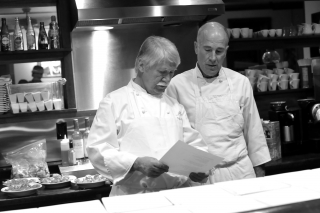
Set the Stage for the Love of Learning
31 October 2023Help students develop a thirst for knowledge that goes beyond the culinary classroom door.
By Paul Sorgule, MS, AAC
Feedback & comments: This email address is being protected from spambots. You need JavaScript enabled to view it.
“We now accept that learning is a lifelong process of keeping abreast of change. And the most pressing task is to teach people how to learn.”
– Peter Drucker, author, leadership, and management guru
What is our legacy as culinary educators? Semester after semester, student after student, we assess the ability and commitment of each person and indirectly assess our performance as well. “How did we do?” We focus on skill development, professionalism, teamwork and problem-solving – this, after all, is what the food industry expects – this is what we are paid to do. Right?
Our curriculum and lesson plans zero in on a shopping list of important outcomes: knife skills, cooking methods, mise en place, palate development, plate presentations, and consistency – the full package of skills for professional cooks; this is what we believe in. Universally, we do a good job with all of this. Our students, in most cases, are ready to hit the ground running. But is this our legacy as educators?
Educators have an opportunity to not only teach and train but more importantly to set students on a course of success in life. When we look in a mirror and ask, “What did we accomplish?” it might very well be setting the stage for the love of learning. If we do our jobs well, our students will understand learning never stops and that seeking knowledge and skills is a lifelong pursuit. Woven through our lesson plans, integrated into our curriculum, hidden but present in our lectures and demonstrations should be a thirst to know more.
We have succeeded as teachers when our students are always seeking the following:
Why?
Are we setting the stage for students to seek answers? Are our assignments focused on helping them seek the source of those answers? Do we challenge them to go beyond the recipe and discover why certain ingredients were used and why the dish was prepared in a certain way? Do we position them to always look beyond the obvious or are they molded to only accept something at face value?
What?
Are we encouraging students to self-assess or do so as a team? Do we end kitchen sessions with a post-production evaluation, asking, “What could we do better or differently next time?” Do we push them to discover what might be the best solution to a problem they encountered?
When?
Is it part of your plan to help students know when it makes sense to ask for help, to defer to another person, or to know when a task is beyond their ability at this moment? Do you push the challenge of timing and make sure a sense of urgency prevails? Urgency is a common shortcoming that chefs state when asked to comment on what culinary programs should emphasize throughout a curriculum.
How?
Teaching students to know how to find answers to challenges rather than thinking they have all the answers in hand is a critical skill. Not having the answer is okay if a student knows where to find it.
What don’t they know?
The thirst for knowledge is based on an understanding that there is always more to learn. When students develop the habit of reaching for more, conditioning themselves to seek out new information, new understanding, and new skills, then their professional brand, openness to others, excitement over the career they chose, and attention they receive from supporters will continue. This thirst for knowledge will serve them well and will define our legacy as teachers. Encourage students to read for the enjoyment of the process. Urge them to interact with others and listen to what is being said. Press them to become aware of their surroundings and what drives the moment. Show them the value of travel and, by all means, demonstrate through your own actions learning never stops.
PLAN BETTER – TRAIN HARDER – LEARN FOREVER
Paul Sorgule, MS, AAC, president of Harvest America Ventures, a mobile restaurant incubator based in Saranac Lake, N.Y., is the former vice president of New England Culinary Institute and a former dean at Paul Smith’s College. Contact him at This email address is being protected from spambots. You need JavaScript enabled to view it..
